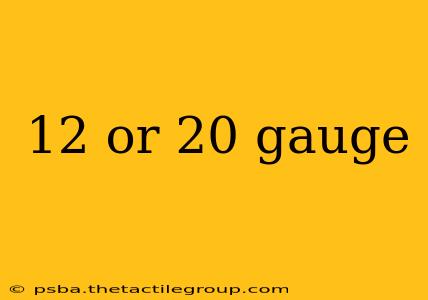Choosing between a 12-gauge and a 20-gauge shotgun is a common dilemma for both novice and experienced shooters. The decision hinges on several factors, and there's no single "best" choice—the ideal gauge depends entirely on your intended use. This comprehensive guide will delve into the key differences to help you make an informed decision.
Understanding Gauge: A Quick Primer
Before we dive into the comparison, let's clarify what "gauge" means. Gauge refers to the diameter of the shotgun's barrel. A lower gauge number indicates a larger diameter barrel, meaning it fires a larger-diameter shell. Therefore, a 12-gauge shotgun has a larger bore than a 20-gauge.
12 Gauge: The Workhorse
The 12-gauge is the most popular shotgun gauge worldwide. Its popularity stems from its versatility and power.
Advantages of 12 Gauge:
- Power and Stopping Power: The larger shell size delivers significantly more power, making it ideal for hunting larger game like deer, turkey, and waterfowl (with appropriate shot). Its superior stopping power is also a significant advantage for self-defense situations.
- Wide Availability of Ammunition: Finding 12-gauge ammunition is incredibly easy, regardless of your location or the type of shot you need (buckshot, birdshot, slugs).
- Variety of Gun Options: 12-gauge shotguns are available in a vast array of styles, from pump-action and semi-automatic to over-and-under and side-by-side configurations. This broad selection caters to diverse preferences and budgets.
Disadvantages of 12 Gauge:
- Recoil: The substantial power translates to significant recoil, which can be uncomfortable, especially for beginners or those with less upper body strength. This can affect accuracy and lead to flinching.
- Weight and Size: 12-gauge shotguns tend to be heavier and bulkier than their 20-gauge counterparts, making them less comfortable for extended periods of carrying.
- Cost: While ammunition is widely available, it can be slightly more expensive per round compared to 20-gauge.
20 Gauge: The Lightweight Champion
The 20-gauge offers a compelling alternative, particularly for shooters who prioritize comfort and lighter weight.
Advantages of 20 Gauge:
- Reduced Recoil: The lighter recoil makes it much more pleasant to shoot, especially for beginners and smaller individuals. This improved comfort leads to better accuracy and less fatigue.
- Lighter Weight and Maneuverability: The reduced weight and smaller size make it easier to handle and carry, particularly advantageous during long hunting trips or tactical situations requiring swift movements.
- Improved Accuracy: The lower recoil can significantly improve accuracy for many shooters.
Disadvantages of 20 Gauge:
- Less Power: The smaller shell size delivers less stopping power compared to the 12-gauge, making it less suitable for hunting larger game or self-defense situations requiring maximum stopping power.
- Limited Ammunition Variety: While readily available, the selection of ammunition types and loads is generally smaller than that of 12-gauge.
- Potential for Overpenetration (with slugs): While generally less powerful than a 12-gauge slug, a 20-gauge slug can still overpenetrate depending on the load and target.
The Verdict: Which Gauge is Right for You?
The best gauge for you depends entirely on your needs and shooting experience:
- Hunters of larger game (deer, turkey): 12-gauge is generally preferred for its superior power and stopping power.
- Hunters of smaller game (quail, doves): Either gauge can be effective; the 20-gauge offers less recoil and improved accuracy.
- Waterfowl hunting: Both gauges are commonly used, with the choice often dependent on personal preference and the size of the waterfowl being hunted.
- Clay target shooting: Both gauges are popular, with the 20-gauge offering a gentler recoil.
- Home defense: 12-gauge offers more stopping power, but the 20-gauge's reduced recoil and lighter weight can be advantageous for some users.
- Beginners: The 20-gauge's reduced recoil is a significant advantage for learning to shoot comfortably and accurately.
Ultimately, renting or borrowing both gauges to test them before purchasing is highly recommended. This will allow you to experience the differences in recoil, handling, and overall shooting experience firsthand, leading you to a more informed and confident decision.

